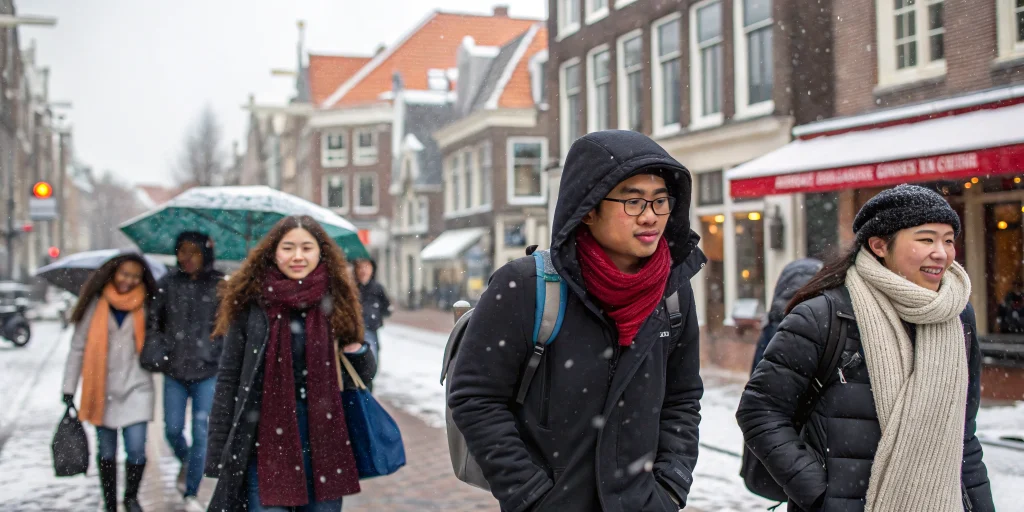Tips for Surviving Your First Winter in the Netherlands: A Guide for International Students
Understanding Dutch Winter: What to Expect
Before diving into practical advice, it’s helpful to know what the Dutch winter typically looks like. The season usually spans from December through February, characterized primarily by:
- Mild, wet winters: This is the most common scenario, involving lots of cloudy skies, rainfall, and damp conditions.
- Cold, dry, and occasionally sunny winters: These colder spells may bring frost and occasional ice formation on canals—although this is becoming less frequent due to climate change.
The flat terrain of the Netherlands means chilly winds can travel unimpeded across the country, often making temperatures feel colder than they actually are. This aspect can be particularly surprising for new arrivals, so preparing for the wind chill factor is essential.
Essential Winter Clothing for Dutch Weather
Proper clothing is your frontline defense against the elements during the Dutch winter. Dressing smartly will allow you to navigate outdoor activities comfortably and remain energized throughout your day.
Outerwear
- Insulated, waterproof winter coat: Choose one designed to block wind and repel water, as rain and wind are common.
- Waterproof shoes or boots with good grip: Slippery pavements are frequent, so sturdy footwear reduces risks of falls.
- Layered clothing: Use multiple layers that can be adjusted indoors, such as thermal shirts, wool sweaters, and light jackets.
Winter Accessories
- Thick socks, with an option to layer for added warmth
- Beanie or warm hat to protect your head from heat loss
- Gloves or mittens made of wool or other insulating materials
- Scarf for neck and face protection against biting winds
- Optional legwarmers and earwarmers for extra insulation during the coldest days
- A stormproof umbrella is vital since Dutch winters can bring wet weather paired with strong winds that easily damage ordinary umbrellas.
By investing in quality winter gear, you’ll be better equipped for the varied winter conditions, helping you stay healthy and focused on your studies.
Prioritizing Health and Wellbeing During Winter
Shorter daylight and cold weather can impact both physical and mental health during the winter months. Being proactive in maintaining your wellbeing will help you avoid common wintertime challenges.
Combatting Seasonal Affective Disorder (SAD)
The reduced sunlight exposure in winter can lead to symptoms of SAD, including low mood and decreased energy. To mitigate these effects:
- Seek natural sunlight during the day by spending time outdoors whenever possible, ideally around midday.
- Maintain a consistent exercise routine, using indoor gyms or home workouts on rainy days.
- Consider light therapy lamps if you notice significant mood changes or lethargy.
- Establish and adhere to a regular sleep schedule to improve overall restfulness.
Nutritional Strategies
Proper nutrition supports your immune system and energy levels in winter:
- Take Vitamin D supplements to compensate for reduced sun exposure.
- Include plenty of fresh vegetables and fruits in your meals to ensure an adequate intake of essential nutrients.
- Stay hydrated even if you feel less thirsty in the cold.
At Study in Netherlands, we emphasize comprehensive support systems that also prioritize students’ health during seasonal changes—helping universities develop tailored communication and student wellbeing initiatives.
Staying Active and Connected Indoors
Winter’s shorter, colder days can sometimes bring feelings of isolation or lethargy. To keep your spirits high and avoid cabin fever:
- Cultivate indoor hobbies such as reading, cooking, or creative arts.
- Organize board games or movie nights with friends or flatmates to maintain social connections.
- Explore local indoor fitness options, including gyms or organized group classes.
- Engage in student community events or university-led winter programs.
Maintaining your social network and physical activity is crucial for a balanced and pleasant winter semester.
Embracing Dutch Winter Culture
Rather than simply enduring the cold, immersing yourself in Dutch winter traditions can enrich your experience and foster a sense of belonging.
- Learn about typical Dutch winter foods such as stamppot (mashed potatoes with vegetables) or erwtensoep (pea soup), which offer both comfort and cultural insight.
- Take part in outdoor activities like ice skating when canals freeze or visit winter markets and festivals.
- Enjoy walks in the crisp winter countryside, appreciating the unique landscapes draped in frost.
As one international student wisely said, “When the weather is bad, put on a good face.” Maintaining a positive mindset can transform your winter experience from a challenge into an opportunity for growth.
How Study in Netherlands Supports International Students Year-Round
Navigating seasons is part of the broader international student journey. At Study in Netherlands, we provide end-to-end recruitment and student engagement solutions that support universities and agencies alike in delivering exceptional experiences.
- Seamless international recruitment strategies ensuring students are well-informed and prepared before arrival, including practical guides on living in the Netherlands.
- Tailored student engagement programs focusing on integration, health, and wellbeing through personalized communications.
- Collaborations with university admissions teams and agencies to provide up-to-date resources that help students transition smoothly.
Explore more about our education recruitment services and how we help unlock international recruitment potential for your institution.
Conclusion
Surviving—and thriving—during your first winter in the Netherlands is completely possible with the right preparation. By understanding the unique weather conditions, investing in appropriate clothing, maintaining your health, staying socially connected, and embracing local traditions, you can make the Dutch winter a rewarding part of your international study experience.
At Study in Netherlands, we are committed to supporting students and educational partners throughout every step of this journey. If you want to learn more about how we can enhance your international recruitment and student support strategies, please contact us today. Together, let’s create a seamless and successful experience for all international students studying in the Netherlands.
Take the Next Step with Study in Netherlands
We encourage you to explore further and make the most of your study experience in the Netherlands.

